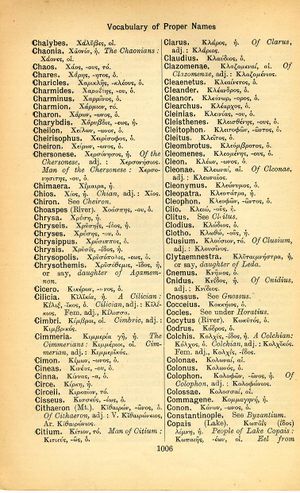Chiron
Οὔτ' ἐν φθιμένοις οὔτ' ἐν ζωοῖσιν ἀριθμουμένη, χωρὶς δή τινα τῶνδ' ἔχουσα μοῖραν → Neither among the dead nor the living do I count myself, having a lot apart from these
English > Greek (Woodhouse)
See Cheiron.
Latin > English (Lewis & Short)
Chīron: (nom. Chīro, Liv. Andron. ap. Fest. s. v. ocrem, p. 181), ōnis, m., = Χείρων,
I one of the Centaurs, distinguished for his knowledge of plants, medicine, and divination, son of Saturn and Philyra (hence, Philyrides Chiron, Verg. G. 3, 550), the tutor of Æsculapius (Ov. M. 2, 630 sq.), Hercules, Achilles, Jason, etc.; at last translated to heaven as a constellation, Hyg. Praef. and Fab. 274; id. Astr. 2, 38; Serv. ad Verg. G. 3, 91; 3, 550; 4, 270; acc. Gr. Chirona, Ov. M. 6, 126.—As a constellation, Luc. 9, 536.—
II Hence,
A Chīrō-nīus or -ēus, a, um, adj., named after Chiron (the physician and botanist).—So subst.: chīrōnīa, ae (sc. herba), a name of several plants: pyxacanthos, Plin. 24, 14, 77, § 125: panaces, id. 25, 4, 13, § 32: ampelos, id. 25, 4, 16, § 34: vitis nigra, id. 23, 1, 17, § 27: Chironium vulnus, Cels. 5, 28, 5; App. Herb. 22: Chironion, a plant, i. q. Centaurion, q. v., Plin. 25, 6, 31, § 66.—*
B Chīrōnĭcus, a, um, adj., pertaining to Chiron: ars, Sid. Ep. 2, 12 fin.>

